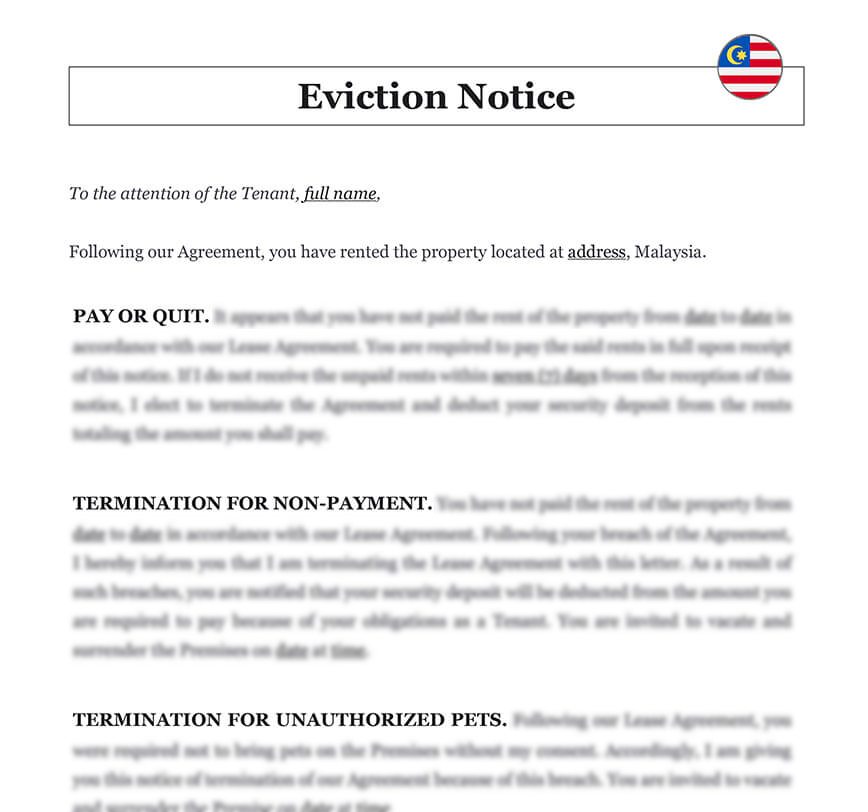Ready to use legal template
Drafted by experienced lawyers
Chinese-English translation
Ready to use legal template
Drafted by lawyers
Chinese-English translation
Home › Rent your property › Eviction notice
Learn more about Eviction Notice in China
An Eviction Notice Letter is a formal document issued by a landlord to notify a tenant of the intention to terminate the lease agreement and request that the tenant vacate the property. This letter serves as a critical step in the eviction process, ensuring that both parties are aware of the legal rights and obligations involved. In China, it is essential for landlords to follow the proper legal procedures when evicting a tenant to avoid potential disputes or legal complications. Our Eviction Notice Letter is easy to edit and available in both English and Mandarin. It is designed to comply with Chinese laws and regulations, ensuring a clear, professional approach to eviction proceedings. Download your copy today for quick and effective use.
Table of contents
-
What is an Eviction Notice Letter in China?
-
What is included in this Eviction Notice Letter?
-
How long is the notice period for an Eviction in China?
-
When can a landlord legally issue an Eviction Notice in China?
-
Can a tenant dispute an Eviction in China?
-
What are the consequences of ignoring an Eviction Notice?
-
Is a court order required after sending an Eviction Notice Letter?
-
Can a landlord evict a tenant without an Eviction Notice?
-
How should an Eviction Notice Letter be delivered in China?
What is an Eviction Notice Letter in China?
An Eviction Notice Letter in China is a formal written notification issued by a landlord to inform the tenant that the lease agreement is being terminated and that the tenant must vacate the property. In China, landlords are required to follow specific legal protocols when evicting a tenant to ensure that the eviction process is fair and legal.
The notice should clearly outline the reasons for eviction, provide a set period for the tenant to vacate, and follow Chinese tenancy laws. Failure to comply with the legal process can result in disputes or complications. It’s crucial that both the landlord and tenant understand their rights and responsibilities under Chinese law, which provides protection for tenants in many cases .This eviction notice is issued in response to violations of clauses outlined in a Lease Agreement.
What is included in this Eviction Notice Letter?
The Eviction Notice Letter includes several key clauses to ensure the eviction process is legal and transparent. Below is a table outlining the critical elements:
| ➤ Tenant Information: The tenant’s full name, to avoid any confusion about who is being evicted. |
| ➤ Property Details: The address of the rental property in China, to clearly identify the premises involved in the eviction. |
| ➤ Non-Payment of Rent: If the tenant has failed to pay rent, they are given a 30-day period to pay before termination. |
| ➤ Lease Termination for Non-Payment: If rent remains unpaid, the lease is officially terminated, and the security deposit may cover the rent. |
| ➤ Termination for Unauthorized Pets: If the tenant keeps pets without approval, the lease is terminated, and they must vacate. |
| ➤ Termination for Property Damage: If the tenant causes damage to the property, the lease is terminated, and repair costs may be deducted from the deposit. |
| ➤ Termination for Unauthorized Sublease: If the tenant has sublet the property without permission, the lease is immediately terminated. |
| ➤ Legal Compliance in China: The eviction notice is issued in accordance with Chinese tenancy laws, ensuring legal enforceability. |
| ➤ Official Issuance by Landlord: The letter must be signed and dated by the landlord for it to be valid and enforceable. |
How long is the notice period for an Eviction in China?
In China, the notice period for eviction can vary depending on the reason for eviction and the terms specified in the lease agreement. Typically, the notice period is at least 30 days for non-payment of rent. However, the law provides different periods for different situations:
| ➤ Non-Payment of Rent: The tenant is usually given 30 days to pay outstanding rent before the landlord can terminate the lease. |
| ➤ Other Violations: In cases of lease violations (e.g., unauthorized pets, damage, subletting), the notice period may be shorter, depending on the severity of the violation. |
For more informations, You can read more about the tenant rights and laws governing these periods on official government resources like China’s Ministry of Housing and Urban-Rural Development.
When can a landlord legally issue an Eviction Notice in China?
A landlord can issue an Eviction Notice when the tenant has violated specific terms of the lease agreement or when certain legal conditions are met. The most common reasons for eviction include:
1. Non-Payment of Rent
If the tenant fails to pay rent after the grace period specified in the lease.
2. Breach of Lease Agreement
If the tenant smokes inside the property, keeps pets without the landlord’s prior approval, disrupts the peaceful enjoyment of the neighborhood, or violates any applicable juristic rules.
3. Property Damage
If the tenant causes significant damage to the property.
4. Unauthorized Subletting
If the tenant sublets the property without permission. Before issuing the notice, landlords should ensure they have followed the legal procedures required by Chinese law to avoid any disputes.
Can a tenant dispute an Eviction in China?
Yes, tenants in China have the right to dispute an eviction if they believe it is unjustified. The table below outlines some common reasons tenants may contest an eviction:
| ➤ Disputing Rent Payment: The tenant claims they have paid the rent or disputes the amount of rent owed. |
| ➤ Incorrect or Unlawful Grounds: The tenant believes the landlord has not provided valid legal grounds for the eviction, such as wrongful termination. |
| ➤ Failure to Follow Legal Procedure: The tenant may argue that the landlord did not follow the correct legal process for eviction, such as providing insufficient notice. |
| ➤ Improper Delivery of Notice: If the eviction notice was not delivered properly (e.g., no proof of receipt), the tenant can dispute the eviction. |
| ➤ Retaliatory Eviction: The tenant might argue that the eviction is retaliatory, such as after complaining about property issues or reporting the landlord. |
| ➤ Inconsistent Lease Terms: If the landlord altered the terms of the lease or failed to uphold their responsibilities, the tenant might dispute the eviction. |
What are the consequences of ignoring an Eviction Notice?
If a tenant ignores an Eviction Notice, there can be serious consequences. Below is a table outlining the potential outcomes:
| ➤ Legal Action by Landlord: The landlord can apply to the court for a formal eviction order if the tenant refuses to leave. |
| ➤ Additional Legal Costs: The tenant may be responsible for the landlord’s legal fees and any other associated costs for enforcing the eviction. |
| ➤ Loss of Security Deposit: If the tenant does not vacate, the landlord may retain the security deposit to cover overdue rent or property damage. |
| ➤ Court-Ordered Eviction: If the tenant continues to ignore the eviction notice, a court-ordered eviction will be issued, and the tenant will be forced to leave. |
| ➤ Damage to Tenant’s Credit: A court-ordered eviction can negatively impact the tenant’s credit score, affecting future rental agreements. |
| ➤ Eviction Assistance from Authorities: The landlord can request local authorities to help remove the tenant if the court order is not followed. |
Ignoring the eviction notice can lead to legal complications and additional costs, which is why tenants should take immediate action to resolve any disputes. For more details, check the Chinese Civil Code.
Is a court order required after sending an Eviction Notice Letter?
In China, a court order is required to formally evict a tenant if they do not vacate the property after receiving an eviction notice. While the eviction notice serves as the initial step, if the tenant refuses to leave, the landlord must apply to the local court for an official eviction order.
The court will review the case and, if the eviction is legally justified, issue an eviction order. Once the order is granted, the tenant will be required to vacate the property, and local authorities may assist in enforcing the eviction.
- Remarks:
The eviction notice must comply with Chinese rental laws. Landlords must follow legal procedures and provide proper notice. Tenants should review the notice carefully and consult a lawyer if they believe the process was not followed correctly.
What is the consequence if I don't send a notice?
If you do not send the eviction notice form, you cannot begin evicting the tenant. First of all, make sure that the landlord has strictly followed the proper procedures. This is because if the landlord has not sent any notice, the tenant may challenge the eviction process and the landlord’s claim and force the landlord to start the whole process over again or not win in court.
Can a landlord evict a tenant without an Eviction Notice?
No, in China, a landlord cannot legally evict a tenant without first issuing an Eviction Notice. The notice is required to inform the tenant of the landlord’s intent to terminate the lease and allows the tenant time to rectify any issues (e.g., unpaid rent) or vacate the property. Skipping the notice process could lead to legal disputes and penalties for the landlord.
How should an Eviction Notice Letter be delivered in China?
In China, the Eviction Notice should be delivered in a manner that ensures the tenant receives it and is aware of the landlord’s intent. Common methods of delivery include:
| ➤ Personal Delivery: The landlord personally delivers the notice to the tenant, ensuring the tenant signs for receipt. |
| ➤ Registered Mail: Sending the notice via registered mail ensures there is proof that the tenant received the notice. |
| ➤ Posting on the Property: If the tenant cannot be located, posting the notice at the rental property may be used, though this method may require additional legal procedures to confirm receipt. |
Conclusion: Why does Eviction Notice Letters matter in China?
The Eviction Notice Letter is a critical document for landlords in China who need to terminate a lease agreement. It must comply with Chinese tenancy laws and include clear details such as tenant information, property address, reasons for eviction, and the required notice period. By understanding the eviction process, landlords can ensure they follow legal procedures, and tenants can protect their rights. Whether for non-payment of rent, property damage, or unauthorized subletting, a well-crafted eviction notice helps avoid disputes and ensures that the process runs smoothly.
SPECIAL OFFER
Landlord
10 Document Package
Essential documents for managing rental property in China
Eviction NoticeTemplate (.docx)
Easy and quick to customize
310 client reviews (4.8/5) ⭐⭐⭐⭐⭐
Share information
Why Themis Partner ?
Make documents forhundreds of purposes
Hundreds of documents
Instant access to our entire library of documents for China.
24/7 legal support
Free legal advice from our network of qualified lawyers.
Easily customized
Editable Word documents, unlimited revisions and copies.
Legal and Reliable
Documents written by lawyers that you can use with confidence.




